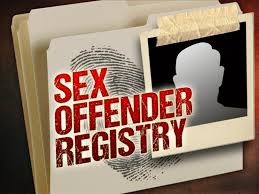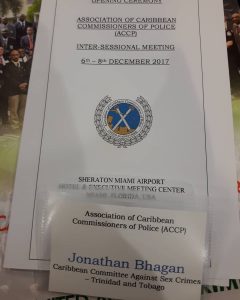Globally, advocates are calling for more transparent reporting of human rights violation. Within the Caribbean, we are seeing a similar pattern with the steady increase or at least improved reporting of human rights violations. Generally, the Latin America and Caribbean region is known for being the most violent region in the world according to the World Bank with crime and violence reaching epidemic proportions. Firstly, for many years, enforcement or monitoring systems were failing to make much of a difference to people’s lives. Secondly, counter measures and updated procedures within this region have been extremely limited.
Furthermore, protecting children from sexual offenders has been an on-going concern. These acts of violation usually permeate for years without clear identification. While the skilful tactics of the perpetrators are increasing, the law and justice system is eons behind. All around the world, there has been louder calls to implement a sex offender registry. The purpose of this registry is to list the possible threats to society, in addition to creating mitigation strategies to preserve the well-being of many who may easily fall prey to such crimes and the growing number of offenders. The Caribbean region has been vocal in championing that call through civil society organizations, especially to create software and a registry in which primarily law enforcement agencies and associated institutions along with the general public would be able to monitor sex offenders.

Caribbean countries take action
The Caribbean Committee Against Sex Crimes (CCASC) was founded in 2014 by Camille St. Omer of the ZandoliUSA foundation. An online meeting was held in March 2015 to call for a regional sex offender registry in order to reduce the high rate of sex crime that is endemic in the Caribbean region. This meeting was attended by over 35 NGOs from across the Caribbean including Jamaica Men Against Rape, Leave Out Violence in Saint Vincent, the Organization for Abused and Battered Individuals from Trinidad and Tobago.
We took the time to speak to Mr. Jonathan Bhagan, who is a lawyer by profession and the Chairman of the Caribbean Committee Against Sex Crimes to get more clarity on the issue.

Photo Credit: Jonathan Bhagan
He explained that creating a sex offenders’ registry does matter to the Caribbean and the world. There is more child pornography online now than ever before according to investigations by the New York Times and other sources. Human trafficking is a growing global phenomenon and with social media, a predator can target children anywhere in the world. Over 2 million children worldwide are victims of human trafficking according to UNICEF.
Additionally, a recent study done by Dr. Justine Pierre and assisted by Nayrobis Rodríguez shows that many Caribbean islands do have a high foreign demand for prostitution. This is related to human trafficking issues within the region.
The challenges with a registry
For many Caribbean countries, creating a sex offenders’ register or any policy to tackle the issue is a complicated one, and one that even presents reluctance by many. Currently, only Trinidad and Tobago, Jamaica and Belize have Sex Offender Registry Laws in some form. The rest of CARICOM have nothing properly institutionalized to help local police authorities monitor potential nefarious activity by sex offenders. Aside from lacking sex offender registration laws, CARICOM states also need to invest millions into their justice systems to ensure that rape survivors would not have to wait 10 years or more to get justice in court.
While the deliberation continues about how Caribbean countries can implement sex offenders’ registers, it is blind-sided not to acknowledge the concerns from the public who are not supportive of these sex offender’s listing. Mr. Bhaghan explained,
there has been concern that public registration will lead to vigilante justice in our small societies or that resource should be allocated elsewhere.
Small island states dilemma
The idea of a sex offenders registry and stronger focus on human rights violations within the Caribbean is a very new phenomenon. It was not until after the 2000s that this conversation has spearheaded. The society is not yet ready to fully receive the recommendations and the measures when dealing with sex offenders and its respective violations. These are valid concerns especially in small-island states where the assumption is that ‘everyone knows everyone’. In small communities there are many close relations and persons are not yet comfortable confronting the issues. On the other hand, if left to fester, we would not want to see citizens taking justice into their own hands and abusing that power.
Additionally, there is a concern that many sexual perpetrators are reliving a cycle in which they were once the victim themselves, especially since in many Caribbean context there have been cultures and incidents of violence perpetuating within the family and communities. As a result, more efforts should be placed on rehabilitative methods for offenders. Also, we should be working to produce a society of empathy, tolerance, and support for the challenges of sexual offenders. Apprehension and punitive measures should be less emphasized in society.
On the other hand, some persons express views that a sex offender’s registry is linked to human rights protection. As stated by Mr. Bhagan,
our entire aim is to prevent human rights abuses. Articles 34 and 35 of the Children’s Rights Convention deal with protecting children from sexual exploitation and trafficking. Rape is a grave systematic human rights violation. Likewise, gender-based violence against women is an ongoing concern. So keep in mind, that even without a public sex offenders’ registry, we can use software to at least track and intercept sex offenders online or those who cross borders in an attempt to monitor and protect persons from potential harm.
Caribbean Countries at Tier 2
Notably, not all human rights violation with sexual offenders may be linked to child pornography, prostitution, or human trafficking. However, in the Caribbean the data suggests that it is correlated in many instances. According to a recent UNICEF report an estimated 223 million children or 10 percent of the world’s children, have been sexually assaulted; this includes 150 million girls and 73 million boys with at least two million children being victims of sex trafficking or pornography.
Most Caribbean islands are “tier 2” or “tier 2 watchlist” countries meaning the governments do not fully comply with the minimum standards of the Trafficking Victims Protection Act. The absolute number of victims of severe forms of trafficking is very significant or is significantly increasing. There is also failure to provide evidence of increasing efforts to combat severe forms of trafficking in persons from the previous year. However, they are making significant efforts to bring themselves into compliance with those standards.
What can you do to assist the cause?
The global conversations about sex offenders continue. In the Caribbean, the work is going at a pace. For Mr. Bhaghan, he has seen steady support and progress as of 2020 with a signed Memorandum of Understanding to cofound “Operation Global Sex Offenders Registry” with Offender Watch, a leading sex offender registry software company. In addition, his organization is in talks with NGOs in Jamaica, Grenada, St. Vincent, St. Lucia and Trinidad and Tobago to do greater work on the issues of rape and human trafficking.
The prospects for 2021 signal opportunity as he explained that the organization hopes to begin research on a model for the “Global Sex Offenders’ Registry” using Caribbean law as a framework. They are doing research to create a model that will allow implementation of Offender Watch software to intercept sex offenders attempting to solicit children on the internet. Also, there are plans to begin crowdfunding and applying for grants to finance the work and to support counter trafficking efforts all around the region.
Lastly, be your brother’s keeper. Let us aim to report to the relevant local authorities incidences of sexual violations whether it is to a minor or an adult. Let us all play an active role in reducing sexual offences in our community by being vigilant and supportive to protect the rights of others.
References
Fox News. “Joint push for Caribbean countries to develop a coordinated sex-offender registry announced.” September 18th, 2020 Retrieved from: www.foxnews.com/world/joint-push-caribbean-countries-develop-coordinated-sex-offender-registry-announced?fbclid=IwAR1F8hFgEQVpVPUw-RtwINiMmVX_g4a4ODhwhV8-ipj4kcK7o6ugkg-RG1M
Jamaica Observer. “Modern-day slavery in Venezuela.” June 29th, 2020 Retrieved from: http://www.jamaicaobserver.com/news/modern-day-slavery-in-venezuela-15-year-old-girl-sold-for-us-300-to-human-trafficking-network-in-trinidad-and-tobago_197257?profile=1013&template=MobileArticle
LOOP TT News. “Trinidadian NGO partners with OffenderWatch to track sex offenders.” September 16th, 2020. Retrieved from: https://www.looptt.com/content/trinidadian-ngo-partners-offenderwatch-track-sex-offenders
New York Times. 2019. Interactive. Retrieved from: https://www.nytimes.com/interactive/2019/09/28/us/child-sex-abuse.html
UNICEF.2020. “Action to End Child Sexual Abuse and Exploitation: A Review of the Evidence 2020”. Retreieved from https://www.unicef.org/media/89026/file/CSAE-Report.pdf
UNICEF.2020. “Childhood Under Threat”. Retrieved from: https://www.unicef.org/sowc05/english/povertyissue3.html
World Bank. 2018. “Stopping Crime and Violence in Latin America: A Look at Prevention from Cradle to Adulthood” May 17th, 2018 Retrieved from: https://www.worldbank.org/en/results/2018/05/17/fin-a-la-violencia-en-america-latina-una-mirada-a-la-prevencion-desde-la-infancia-hasta-la-edad-adulta#:~:text=Crime%20and%20violence%2C%20particularly%20violent,North%20America%2C%20Europe%2C%20and%20Asia
IVolunteer International is a 501(c)3 tech-nonprofit registered in the United States with operations worldwide. Using a location-based mobile application, we mobilize volunteers to take action in their local communities. Our vision is creating 7-billion volunteers. We are an internationally recognized nonprofit organization and is also a Civil Society Associated with the United Nations Department of Global Communications. Visit our profiles on Guidestar, Greatnonprofits, and FastForward.

